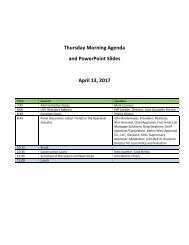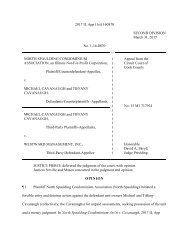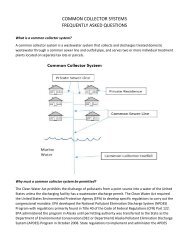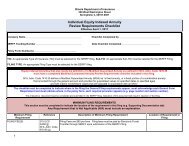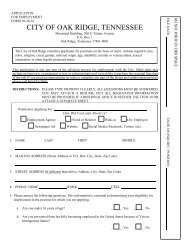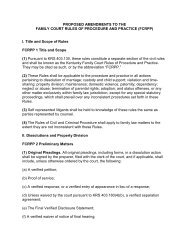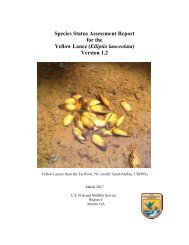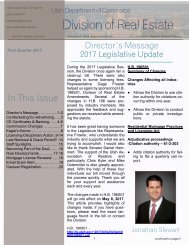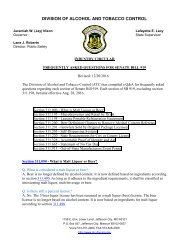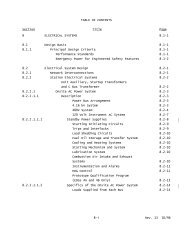Safety
JanFeb2017
JanFeb2017
You also want an ePaper? Increase the reach of your titles
YUMPU automatically turns print PDFs into web optimized ePapers that Google loves.
do — especially if others are counting on you to fly<br />
them somewhere — but delaying or postponing a<br />
flight due to stress is always a good call.<br />
There are several ways to help manage stress<br />
and prevent it from accumulating. For starters, try<br />
maintaining a regular exercise regime and make<br />
relaxation a priority in your daily schedule; have you<br />
actually ever tried yoga? It’s a great way to combine<br />
the two. Sharpening your time<br />
Stress can affect people differently, management skills can also help<br />
so it’s really important for you to<br />
reduce stress by meeting deadlines<br />
and keeping those honeydo<br />
lists from growing too large.<br />
have a way of gauging a clear head<br />
and a sound state of mind before<br />
Finally, an FAA study in 2000<br />
taking that flight.<br />
on the impact of stress in aviation<br />
found that the top ranked stress coping strategy<br />
among participants was a stable relationship with a<br />
partner, so don’t be afraid to bend your spouse’s ear!<br />
To learn more about how stress can affect<br />
your performance, watch this FAA video<br />
(www.faa.gov/tv/?mediaid=450) and check out the<br />
article “Stress in Flight” in the Jan/Feb 2009 issue of<br />
FAA <strong>Safety</strong> Briefing.<br />
Alcohol — Have I Had a Drink in the Last 8<br />
Hours? 24 Hours?<br />
For many, “throwing back a few” can be an effective<br />
way to relax and unwind after a tough day. But<br />
if flying is on your horizon, you’ll want to reconsider<br />
your actions. Like beer and wine, the two just don’t<br />
go together. The regulations (14 CFR section 91.17)<br />
say you may not operate an aircraft within eight<br />
hours of having consumed alcohol. Given the lingering<br />
effects alcohol can have on the human body, it’s<br />
best to pad that time and wait 24 hours before flying.<br />
And if you were really in a “celebratory mood,” keep<br />
in mind that the damaging effects of booze can last<br />
48 to 72 hours following your last drink in the form of<br />
a hangover and well after your body has eliminated<br />
all alcohol. Add in night conditions or bad weather<br />
to any of these scenarios, and the negative effects on<br />
flying can be magnified greatly.<br />
For more information, have a look at the FAA’s<br />
brochure “Alcohol and Flying — A Deadly Combination”<br />
at http://go.usa.gov/xkFJd.<br />
Fatigue — Am I Properly Rested?<br />
The impact of fatigue in the aviation industry<br />
is an all-too-common phenomenon. Although it’s<br />
rarely the singular cause of a fatal accident, the term<br />
pilot fatigue is riddled throughout NTSB probable<br />
cause reports in all segments of aviation. It’s more<br />
commonly the ugly precursor to many poor last<br />
decisions (or indecisions). As to why a simple lack<br />
of rest is not mitigated more often, some might say<br />
it’s because it can be easily remedied with coffee or<br />
an energy drink, or that it’s just something they feel<br />
is a nuisance they can power through. Both are false<br />
narratives that gravely underestimate fatigue’s disastrous<br />
potential.<br />
In order to manage fatigue, it’s important to<br />
listen to what your body is telling you. Do you feel<br />
yourself uncontrollably yawning? Are your<br />
eyes bloodshot and bleary? Are you<br />
feeling sluggish or slow to react? Keep<br />
in mind that fatigue isn’t limited to just<br />
these more obvious signs. It’s often a<br />
more insidious problem fueled by a<br />
creeping accumulation of inadequate<br />
rest (e.g., long nights at the office, a new<br />
baby in the house, etc.) Fatigue can also<br />
be caused by physical exertion. Those<br />
first few great-weather flying days we<br />
look forward to in the spring are usually<br />
accompanied by a mountain<br />
of strenuous yard work.<br />
14 FAA <strong>Safety</strong> Briefing January/February 2017



